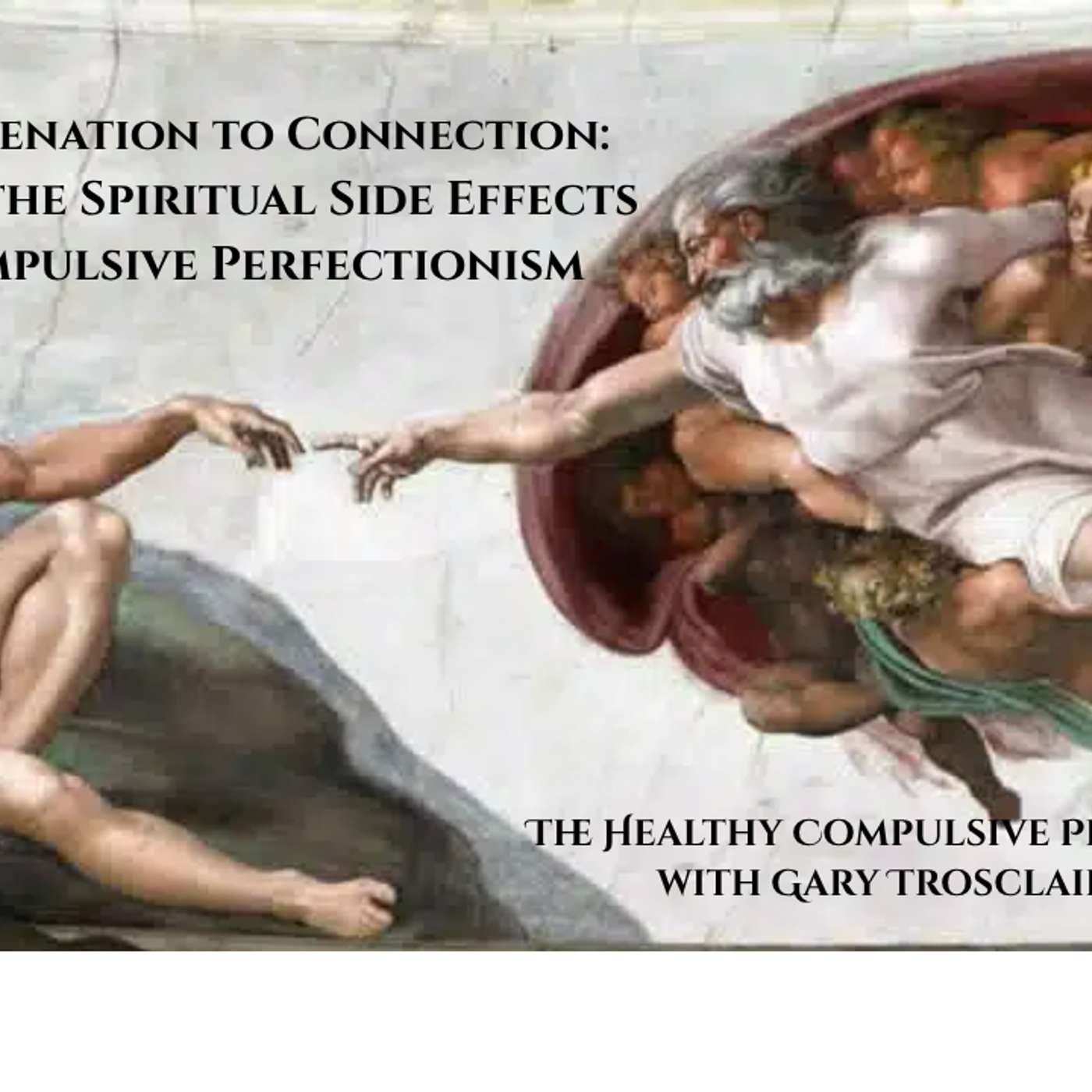Discover The Healthy Compulsive Project
The Healthy Compulsive Project

The Healthy Compulsive Project
Author: Gary Trosclair
Subscribed: 35Played: 1,541Subscribe
Share
© Gary Trosclair
Description
For five years The Healthy Compulsive Project has been offering information, insight and inspiration for OCPD, obsessive-compulsive personality, perfectionism, micro-managers and Type A personality. Anyone who’s ever been known to overwork, overplan, overcontrol or overanalyze is welcome here, where the obsessive-compulsive personality is explored and harnessed to deliver what it was originally meant to deliver. Join psychotherapist, Jungian psychoanalyst and author Gary Trosclair as he delves into the pitfalls and potential of the driven personality with an informative, positive, and often playful approach to this sometimes-vexing character style.
109 Episodes
Reverse
Receiving an OCPD diagnosis can leave you unsure where to begin, but the traits that once fueled rigidity and perfectionism can also support meaningful change. This guide introduces RAILS, a five‑step framework designed to help you start removing the “disorder” from your obsessive‑compulsive personality. The steps encourage building self‑respect, acknowledging how maladaptive perfectionism has caused harm, identifying the protective strategies you’ve used to manage insecurity, learning to sit with uncomfortable emotions rather than avoiding them, and realigning your daily actions with your true values and priorities.By consistently practicing these tools—through therapy, journaling, reading, support groups, or open conversations—you gradually rewire old patterns and melt the rigidity that has held you back. With patience and sustained effort, you can shift toward the healthy, adaptive end of the obsessive‑compulsive spectrum and create a more flexible, authentic, and fulfilling life.
A Husky narrates a compassionate, humorous, and perceptive account of living with a human who has obsessive‑compulsive personality disorder traits. Through keen canine observation, the Husky contrasts natural dog instincts—flexibility, presence, connection—with the rigid routines, perfectionism, rationalization, and emotional struggles of the human world. The story explores themes of routine, control, relationships, emotional expression, and the possibility of change. Ultimately, the dog encourages humans to keep perspective, let go more easily, and remember what truly matters: connection, simplicity, and a few good belly scratches.
What if the machine controlling your life isn’t out there—but inside you? Using The Matrix as a lens, this post exposes how maladaptive obsessive‑compulsive personality patterns act like internal programs that hijack authenticity, drain energy, and keep us locked in a dream of perfection, urgency, and control. Drawing from psychological research and Jungian theory, it reveals how these inner mechanisms develop, how they deceive us, and—most importantly—how we can take the red pill, wake up, and choose a more conscious, compassionate way of living.
It takes courage to make a relationship work. The courage to admit you’re wrong. The courage to persist when you’re right. The courage to take chances in communication, generosity and vulnerability. And most of all, the courage to objectively look at what’s happening emotionally inside of you. This episode explores projection and projective identification, two psychological processes that can make or break a relationship. It also suggests way to handle them when they're happening and to prevent them from happening in the first place.
Ever felt like something was “just not right” even when nothing is wrong? Psychologists call these Not Just Right Experiences (NJREs)—a subtle but powerful force behind OCD and OCPD. Learn what they are, why they matter, and how to manage them before they hijack your peace of mind.
We’ve got perfectionism all wrong. The real problem isn’t high standards—it’s the illusion of perfectibility and harsh judgment that have been grafted onto it. Perfectionism began as a guide toward purpose, but centuries of distortion turned it into an enforcer of impossible ideals. Instead of banishing perfectionism, we can reclaim its adaptive side—commitment, persistence, and pursuit of excellence—while stripping away conceit and control. By befriending perfectionism, acknowledging its shadow, and clarifying our purpose, we transform it from a tyrant into a trusted partner. This episode brings together science and Jungian psychology for an unconventional approach to dealing with perfectionism.
Explore practical insights and nuanced strategies for working with clients who have obsessive-compulsive personality traits. Drawing on 33 years of experience, this post addresses common challenges, misconceptions, and ways to foster meaningful change—while offering a behind-the-scenes look for those in therapy.
This is an extended interview in which endurance athlete, coach, and podcaster Travis Macy asks me about the driven personality and broader questions of well-being. Having set records in some truly astounding endurance races, Travis knows about perseverance, resilience and fortitude, all of which exist as potential in the obsessive-compulsive personality. We compare notes about competition, athletics, optimizing our energy, dealing with tension, and approaching our goals in a healthy way. We touch on developing a better relationship with the body, how mindfulness meditation actually helps, and how Chronic Urgency Stress Syndrome (CUSS) will drive us crazy if we don't hold what's most important foremost in our minds.
This essay explores how perfectionist and obsessive-compulsive personalities construct “fortresses” to avoid humiliation, embarrassment, and shame. Through vivid stories and cultural examples—from Steve Jobs to Michael Jackson—it identifies four compulsive types (Boss, Workaholic, People-Pleaser, and Obsessor) and shows how their strategies both protect and imprison them.
Carl Jung famously wrote that the gods have become diseases. What he meant was that because we no longer consciously acknowledge the powerful forces we used to call gods and goddesses, they’ve gone underground and manifest in our physical and mental ailments. However unbelievable they might seem, they are still forces to be reckoned with. Such is certainly the case with Ananke, the Goddess of fate, compulsion and inevitability. People with a need to control can learn a great deal from her.
Explore how compulsive perfectionism creates alienation, and the science-backed benefits of as sense of connection to something larger than yourself. And discover practical ways to restore a sense of connection with Nature and the Universe for greater peace and well-being.
To make a dent in the pile of material you might feel you have to read to be up on the most recent developments in mental health, here's a practical review of the relatively new approach to therapy called Acceptance and Commitment Therapy, with brief examples of how to apply it. Because one of the main goals of ACT is flexibility, it can be very helpful to anyone struggling with obsessive-compulsive personality disorder (OCPD), or to those just challenged by some obsessive-compulsive traits, perfectionism, workaholism, or Type A personality.
Anxiety dreams may seem simply like a nuisance at first glance. But slow down and pay attention and you might find they have something to tell you about how you are living and how you see your world. Issues of avoidance, authenticity, and being tested can all show up in anxiety dreams. Seen as a source of wisdom, these dreams can lead you in new directions should you choose to engage with them.
Creativity may be one of the most fulfilling activities we have. Unless it’s blocked. Then the desire to be creative can feel like torture. But there are ways to get unblocked. In this episode we will talk about the possible benefit of compulsive urges, and the destructiveness of obsessive thinking. We’ll look at how the avoidance of feelings of anxiety and insecurity becomes a block. And we’ll look at the positive benefits of being in the present moment, and personifying The Blocker can be helpful.
Seriousness is an occupational hazard for obsessive-compulsives, Type A's and perfectionists. Being serious can hurt relationships, mental health and physical health. Yet many of us feel duty-bound to be serious, and we lose out on the benefits of humor and laughter--which can melt the rigidity which comes with being so serious.
What happens when a rigid devotion to rules, order, and perfection replaces our ability to feel, connect, and live? In this episode, we explore two moving character studies from Fredrik Backman’s novels A Man Called Ove and Britt-Marie Was Here. Through Ove and Britt-Marie—both fictional but deeply familiar—we see the beauty, heartbreak, and potential of the obsessive-compulsive personality. These stories show what can go wrong when emotional life is outsourced or buried—and what can go right when we begin to reclaim it. From tragic emotional isolation to unexpected transformation, this conversation offers insight, humor, and hope for anyone trying to loosen the grip of perfectionism.
How do we know if we are micromanaging? If you constantly look over someone’s shoulder, give them detailed instructions, distrust them, and make mountains out of molehills, it will discourage creativity, diminish morale, and disrupt relationships. It may even lead to them ignoring you. It brings about the opposite of your desired effect. Productivity, responsibility and ingenuity all decrease. It's like trying to break a horse to train it. Instead we need to macromanage, to consider the larger picture of our values and priorities.
Is RO DBT a new answer for overcontrol and obsessive-compulsive personality disorder (OCPD)? This post introduces Radically Open Dialectical Behavior Therapy, a treatment developed for overcontrolled personalities, and explores how well it fits the traits and needs of those with OCPD. Clinical insights, pros and cons, and personal reflections included.
How do perfectionist and compulsive traits shape fatherhood? This post explores the challenges and opportunities for the obsessive father—how those traits can either alienate or elevate, harm or heal. Learn how self-awareness, values, and mindset can help fathers navigate the line between heroic and harmful.
Compulsive behavior is often dismissed as neurotic, but what if it's a deep call for connection and purpose? This post explores the redemptive potential of obsessive-compulsive personality traits—how they can become a source of meaning, growth, and compassion when understood properly.








